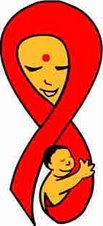
"World AIDS Day" is celebrated globally every year on the first day of the month of December. Around forty million people are living with HIV throughout the world - and that number increases in every region every day. Ignorance and prejudice are fuelling the spread of a preventable disease.
World AIDS Day, 1 December is an opportunity for people worldwide to unite in the fight against HIV and AIDS. This year, it's up to you, me and us to stop the spread of HIV and end prejudice.
This starts by taking action.
You: Wear a red ribbon
Me: Talk to people
Us: Get involved in events
India's President APJ Abdul Kalam on Friday asked lawmakers to ensure that legislation to end discrimination against HIV/AIDS patients is brought into force in the next six months. "It is for the members of parliament to sit together and pass a legislation, which would prevent discrimination against AIDS patients in their day-to-day life," Kalam said in an address to the parliamentarians on the occasion of World AIDS Day.
"The Ministry of Health is working on a draft legislation and I would call upon the members to see that a robust and effective legislation is brought into force within the next six months," he added. In his speech, Kalam also urged the government to work towards making the cost of anti-retroviral drugs more affordable.
According to UN reports, many HIV positive people suffer discrimination in India as there is a low level of awareness and a stigma attached with the pandemic. This is despite that fact that India has the largest population of HIV infected people worldwide, accounting for 5.7 million of the 39.5 million HIV/AIDS cases globally.
HIV-positive people often face discrimination at their workplace, have been rejected by families, spouses and communities and in many cases are refused medical treatment at hospitals and clinics. A recent study found that one-quarter of HIV-infected people were refused medical treatment on the basis of their HIV-positive status.
The discrimination has been hindering efforts to prevent new infections. Meanwhile, thousands of activists and HIV-positive people participated in a number of rallies in New Delhi and other Indian cities to mark the World AIDS day.
The observance of Worlds AIDS Day began in 1988, two years after the first HIV case was detected in India. India's Health Ministry claims that it has contained the prevalence of the epidemic to less than one per cent of the adult population.
In recent years the Indian government has been focusing its AIDS control programme on the country's massive youth population. In this connection, Kalam stressed that for a more effective awareness campaign among the young and high-risk groups, rural and religious bodies should reach out to more people. There are 280 million young people in India, or 25 per cent of the population, and nearly 50 per cent of new HIV infections are among this 15 to 24 age group.
© 2006 DPA

3 comments:
This week I attended two events about HIV/AIDS, both for sure in conjunction with yesterday, Dec. 1st, world aids day. Yesterday I was at BAM for a concert celebrating the life of Fela Kuti, the famous nigerian composer and musician who died of AIDS in 1989. I went to AIF/Staying Alive event earlier in the week as well and found the discussion, presentations and dialogue that was raised during the meeting super interesting. Although in retrospect I never really found out how AIF and Staying Alive are going to work together. Will it be a relationship of funding, a relationship of ideas or a combination of mutual cooperation in reference to how AIF wants to attack this very real and extremely serious problem of AIDS in India. The lack of discussion about sex, let alone AIDS, throughout the country is frightening and of course, a culture is a culture and openness about some things never translates to openness about everything but when people are dying, instigating discussion within communities, within families, between husbands,wives and lovers is critical. even if some people may be offended. There was talk at the AIF meeting about negative advertising, how its been proven that scaring people puts people off and alienates people. I think about ACT UP in the 1980s and early 90s, I think of die ins, and silence broken. People living with AIDS in the 80s were alienated and people without AIDS were confronted and forced to say AIDS exists. Silence=Death, that's for sure in India.
Let's all put our two sense into this one, forget about outsourcing, that's kind of stuff is irrelevant when AIDS is killing so many poor folks.
Thanks for taking the time to read this. Sincerely, Ben Lenzner
Ben is right, I attended the event and I think it is time that we all speak up and talk about this deadly virus. It is time that we educate ourselves and otehrs to remove the myths and bring in the facts. It is not a problem of "those people" this is our generation's epidemic and we need to work to battle it. I wear the red ribbon everyday to work in the month of Decemeber and start the conversation about HIV/AIDS with people. Thank you for organizing the event. I came with my friend and we really were inspired to do more to fight AIDS.
Pls Check :
http://www.naujawan-e-hind.blogspot.com/
Post a Comment